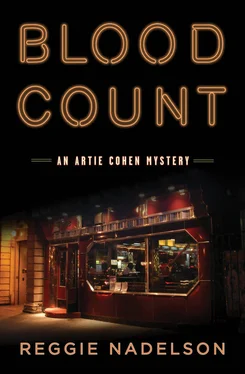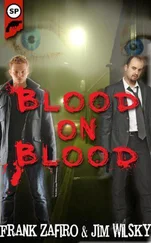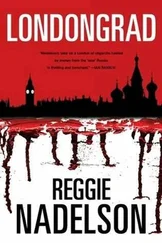Reggie Nadelson - Blood Count
Здесь есть возможность читать онлайн «Reggie Nadelson - Blood Count» весь текст электронной книги совершенно бесплатно (целиком полную версию без сокращений). В некоторых случаях можно слушать аудио, скачать через торрент в формате fb2 и присутствует краткое содержание. Жанр: Триллер, на английском языке. Описание произведения, (предисловие) а так же отзывы посетителей доступны на портале библиотеки ЛибКат.
- Название:Blood Count
- Автор:
- Жанр:
- Год:неизвестен
- ISBN:нет данных
- Рейтинг книги:5 / 5. Голосов: 1
-
Избранное:Добавить в избранное
- Отзывы:
-
Ваша оценка:
- 100
- 1
- 2
- 3
- 4
- 5
Blood Count: краткое содержание, описание и аннотация
Предлагаем к чтению аннотацию, описание, краткое содержание или предисловие (зависит от того, что написал сам автор книги «Blood Count»). Если вы не нашли необходимую информацию о книге — напишите в комментариях, мы постараемся отыскать её.
Blood Count — читать онлайн бесплатно полную книгу (весь текст) целиком
Ниже представлен текст книги, разбитый по страницам. Система сохранения места последней прочитанной страницы, позволяет с удобством читать онлайн бесплатно книгу «Blood Count», без необходимости каждый раз заново искать на чём Вы остановились. Поставьте закладку, и сможете в любой момент перейти на страницу, на которой закончили чтение.
Интервал:
Закладка:
“Yeah?”
“She looks posed,” said Radcliff. “You look at her, hands crossed, all tidied up, lying there like something in a church. Like somebody found her looking fucked up and put her right. It’s too neat.” He looked at me. “You thought that, too, didn’t you, Artie?”
“Maybe. You told Lily?”
“I tried, but she started crying. I don’t know. I don’t understand, and I’ve known her most of a year…You ever see her like this?”
The way he acted, doing the right thing for Lily, even saying she needed me, made him seem like a guy who knew his relationship was so solid he could ask her ex-boyfriend for help.
He turned his phone back on, looked at the screen.
“I have to go,” he said. “I’ll get back as soon as I can. So we’re on the same page, right, Artie?”
I looked at the door. “Where the hell is Lily?”
CHAPTER 7
After Radcliff left, I went across the hall and rang Lily’s bell. Nobody answered.
A couple, tall, thin people-from their height and their looks, I figured them for Ethiopian or Somali-hurried along down the hall toward the elevator. They looked at me briefly and moved on. From the apartment next to Simonova’s a dog barked, then the door opened a crack. The face of a very old woman-dark skin, little yellow silk cap fitted down tight on her head-looked out. She stared at me for a second or two, then shut the door. In another apartment music played, but I couldn’t make out what the song was, and then I looked at my watch. It was ten past eight.
I got out my cell and called Lily and she said she was in the shower, she was changing her clothes, said for me to wait in Simonova’s apartment. She seemed obsessed with the idea somebody had to be with the body.
“I called Dr. Bernard, OK? I called like you wanted me to,” Lily said. In the background I could hear water running and I tried not to think about how she looked in the shower. She hung up and I went back to Simonova’s apartment.
I felt it again when I looked at the body, something visceral, one of those flickers of intuition that’s mostly physical, that runs up your neck and makes you shiver, pressing your brain into action. In the apartment there was something I couldn’t see right, something I didn’t understand.
Virgil Radcliff was gone, but the idea I might call the ME had worried him plenty. He didn’t want this made official in any way.
Did he know something he wasn’t telling me? Did he sense Lily was somehow involved and was trying to protect her?
I took the shawl off Simonova’s face. It seemed grotesque that the cannula was still hooked in her nose, the oxygen tank still breathing for a dead woman. I removed it carefully. She had hairy nostrils, which reminded me of Stalin, of what my father told me he had felt when he saw Stalin lying in state in the Hall of Columns in Moscow. Hairy nostrils.
Years after we left Russia, my father told me how terrible he had felt back then when, looking at the great man, he saw only the huge hairy nostrils.
After I covered Simonova up again, I pushed the oxygen tank into a closet and noticed a small pile of Christmas presents under a scrawny tree hung with red tinsel draped on the branches. I looked at the tags, saw there was a present from Lily, another from somebody named Carver. I stopped what I was doing then, because for the second time that morning, I heard water dripping. It wasn’t in the living room.
I looked around the rest of the apartment. In one of the bedrooms, there was water running in from the roof onto the heavy plastic sheeting that shrouded everything-bed, dresser, chairs, clothes racks.
The room was a mess. Water had stained the yellow paint, and in places, slabs of plaster had come loose and dripped down the wall like candle wax. In one corner, there was mold that had grown down the wall in long fingers. More mold was on pictures that lay on the floor. It had somehow encroached on the images behind glass, making strange frames for them. One was a photo of a group of Russians near a dacha, five people in shabby clothes. In the 1950s, I guessed. The other was of Lenin.
I fixed the plastic sheets as best I could, shut a window that had been left open a couple of inches, and tried to call Lily on my cell. She didn’t answer.
I needed air. In the living room, I got my jacket and went out onto the terrace. I had only been in the building for a few hours, but I already felt trapped in it.
Snow was falling harder, big flakes, blown by a hard wind across the city. It fell onto the terrace where I was standing now. From my pocket I got out a wool hat and jammed it on my head.
I gulped some cold air, then I leaned out and looked at the street below.
From the terrace, which wrapped around the end of the building, I could see in almost every direction. The Armstrong was the tallest building in the area, fourteen floors of yellow brick at the northern end of Harlem. Up here I had a spectacular view of the city, even though it was blurred by the curtains of snow.
At the back of the building was a parking area enclosed by wire fencing. There was a row of garbage cans chained together. In front was Edgecombe Avenue and Jackie Robinson Park, trees bare, and the Harlem River. Beyond it was the tangle of highways, the Bronx, Yankee Stadium. It would be gone soon. Torn down to make way for some new stadium without any history.
I had loved the days and nights I’d spent at the Stadium ever since I got to New York; loved the games, the crowds, the noise, the singing, the players, the beer and dogs. Loved the camaraderie, the way you met other fans over and over, got to know them and their kids. I loved the playing of “New York, New York” when we won, the whole corny ball of wax. My New York.
North and west were the Hudson River and the George Washington Bridge, shadows through the snow. To the south, all of Harlem, stretching to 110th Street and Central Park and down to the sky line-the Empire State, the Chrysler Building, but these, too, were only phantoms today. Here up on Sugar Hill, the rest of the city felt far away.
I once got to know a musician at Bradley’s downtown-it’s long gone now-who had lived his whole life in Harlem. One night, he’d said: “Black America, Artie? It’s another country. And Harlem is black America.” He’s been dead a while now, and I can’t remember his name.
If you live downtown like I do, Harlem feels like a different planet, low-lying, wide, spacious boulevards, trees. Harlem had barely mattered economically for so long that no one bothered to tear most of it down. It’s remained, for better and worse, suspended in its own past.
A decade ago, maybe, as city real estate prices soared, fear of losing out on a piece of the pie made Harlem a tasty prospect. A lot of it was broken down, some of the buildings condemned. But there were the great apartment houses like the Armstrong, there were the fabulous brownstones on Strivers’ Row; you saw ads in the Times for Harlem alongside those for Central Park West, Soho, the Village.
Houses went on the market for a million bucks. Developers talked about Harlem as if it were the Promised Land. All that housing stock, they’d say, practically licking their lips. And people moved. The New Harlem, they called it. A few bistros opened for business. Somebody set up a supper club and charged big bucks for a membership. A guy in real estate I sometimes play a little ball with used to tell me about all this, salivating. I told him I love where I live. Anyhow, I’m always broke.
Earlier, I’d noticed the date on the Armstrong: BUILT 1919. It must have been named later. In 1919, Louis Armstrong was only eighteen.
As soon as I’d arrived, I’d seen the building notices stuck to the beveled glass in the heavy front door. In the lobby there were ladders, cans of paint, part of the floor covered with a drop cloth. I wondered whether the crunch of the last months would stop the New Harlem dead, how much would sink in the financial shit storm.
Читать дальшеИнтервал:
Закладка:
Похожие книги на «Blood Count»
Представляем Вашему вниманию похожие книги на «Blood Count» списком для выбора. Мы отобрали схожую по названию и смыслу литературу в надежде предоставить читателям больше вариантов отыскать новые, интересные, ещё непрочитанные произведения.
Обсуждение, отзывы о книге «Blood Count» и просто собственные мнения читателей. Оставьте ваши комментарии, напишите, что Вы думаете о произведении, его смысле или главных героях. Укажите что конкретно понравилось, а что нет, и почему Вы так считаете.












